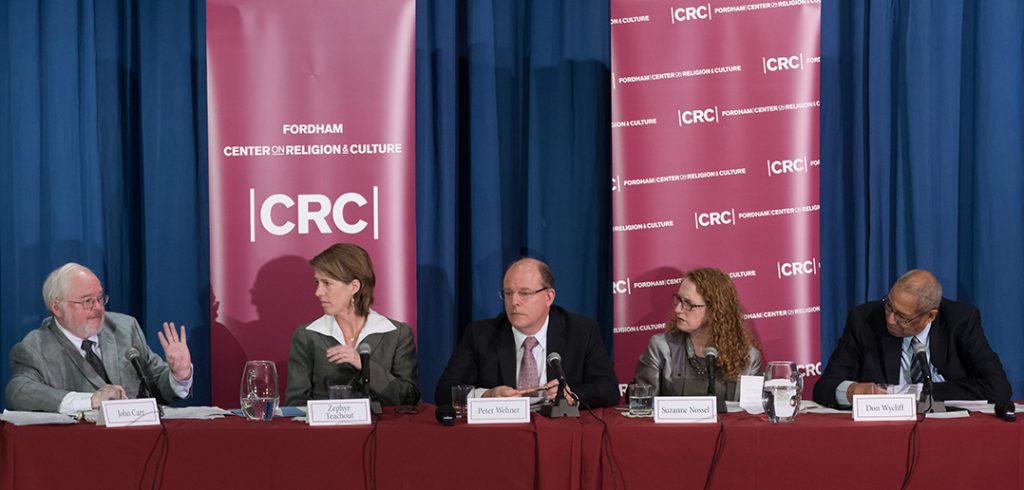The echoes of the 2016 presidential election reverberated loudly at a panel discussion held at Fordham’s Lincoln Center campus on Nov. 29.
In the panel discussion “Imperfect Union: Has America Lost its Moral Center?” organized by Fordham’s Center on Religion and Culture, participants discussed the degradation of foundational principles of equality, tolerance, and free speech, in the United States over the past year.
Moderator Don Wycliff, a columnist for Chicago Catholic and contributor to Commonweal magazine, noted that the evidence that the country has lost its moral center seems to be everywhere. In Alabama, he noted, U.S. Senate candidate Roy Moore has the support of the Republican party, and is leading in many polls, despite multiple accusations of pedophilia against him.
“We elected a president who seems to respect none of the traditional norms. Maybe things need to be shaken up, but calling into question the respect for the rule of law and other such basic principles is very radical,” he said.
The Threat of Fake News
Suzanne Nossel, executive director of PEN America, mounted a spirited defense of the independent press. The truth is at the top of the list of things we’re at risk of losing, she said, citing the fact that that very morning, President Trump shared on Twitter misleading and false videos ostensibly showing Muslims attacking non-Muslims.
Fraudulent news is a serious threat to open, healthy and vibrant discourse, she said, and according to Gallup, only 32 percent of Americans said they have a fair amount of trust in the news media last year, down 8 percentage points from the year before, and more than 20 percentage points lower than 1997.
‘We see some boost in readership over the last year as we all rally around the Washington Post and the New York Times, but that comes the Eastern seaboard and from people around the world,” she said.
“It’s not coming from the heartland, where we see an erosion of trust and interest in the mainstream media.”
Peter Wehner, a senior fellow at the Ethics and Public Policy Center and former deputy director of speechwriting for President George W. Bush, lamented the direction his party had taken and predicted that if it continued in its the current trajectory, he’d leave the party.
“Any nation that elects Donald Trump as president has a remarkably low view of politics. He ran for president with no experience and no obvious qualifications for the job, and it’s manifested itself every day since he took office,” he said.
Changing Expectations of Politics
Trump didn’t materialize from nowhere, however. Wehner noted that American politics has become an arena for conflict rather a place for problem solving. He advocated for inclusive prosperity, and for politicians to make the case for politics as a force for good.
“Politics has become a replacement for community and meaning, and a sense of belonging for a lot of people. I think that explains in large part some of the tribalism we’re seeing,” he said.
“We have to recover the deep purposes of dialogue and debate, which is not to win, but to get a little closer to the truth.”
Zephyr Teachout, professor at Fordham School of Law, likewise highlighted larger trends. During her recent campaign for New York’s 19th congressional district, she said she encountered an unbelievable amount of loneliness.
“I think loneliness is incredibly important part of understanding where we are in this particular moment,” she said, noting that the prevalence of hallowed out retail areas across the country.
“Loneliness has a lot of sources, but commercial life, like as civic life, has always been part of the way in which we come together.
We have forgotten the importance of anti-trust laws, not just to take on these big guys who are stealing our tax dollars, but also to support a thriving small business community. The other political story of 2016 is not Donald Trump; it’s the fact that we had more big mergers than we’ve ever had.”
There are also two different but complimentary kinds of excessive individualism at play in American politics, said John Carr, director of the Initiative on Catholic Social Thought and Public Life at Georgetown University.
On the right, economic individualism has been blended with nationalism and racial resentment. On the left, personal autonomy has been elevated above all else. Neither makes room for the common good, for care for the poor and the vulnerable, or for dealing with racism or economic and educational disparities.
“In one, we’re really on our own, in the other we’re a collection of interest groups. When you add in polarization and ideological isolation, it leads to a kind of tribalism that is based on resentments, feeds our anger and makes it very hard to pursue the common good,” he said.

